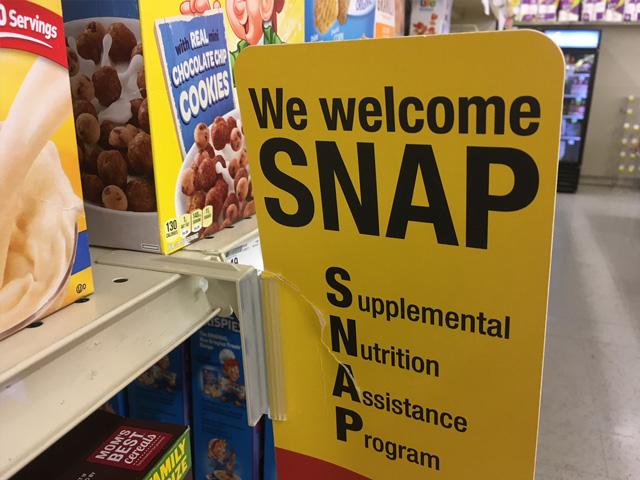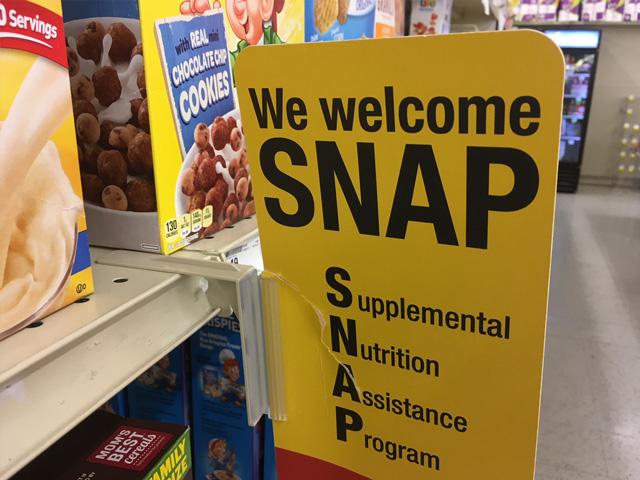Ag Policy Blog
Judges Order USDA to Tap Contingency Fund for SNAP Benefits
UPDATED: President Donald Trump, in a social media post late Friday afternoon, said government lawyers did not think the administration had the legal authority to fund SNAP, but he said two court "have issued conflicting opinions on what we can and cannot do."
Trump blamed Democrats for shutting down the federal government, but said he has instructed lawyers to ask for clarification on how the federal government can fund SNAP.
"If we are given the appropriate legal direction by the Court, it will BE MY HONOR to provide the funding just like I did with Military and Law Enforcement Pay."
Two U.S. district judges in separate cases on Friday ruled USDA has both the funds and authority to provide benefits to nearly 42 million people on the Supplemental Nutrition Assistance Program (SNAP) -- the country's largest food-aid program.
U.S. District Judge John McConnell Jr. in Rhode Island ordered USDA to issue November SNAP funds. McConnell was ruling in a case brought by cities and outside organizations that sued USDA over the payment freeze.
"There is no doubt -- and it is beyond argument -- that irreparable harm will begin to occur, if it hasn't already occurred in the terror it has caused some people about the availability of funding for food for their family," McConnell said, according to the Washington Post.
Separately, U.S. District Judge Indira Talwani in Massachusetts ruled Friday USDA has authority to tap a $6 billion contingency fund for the Supplemental Nutrition Assistance Program (SNAP) and requested the Trump administration inform the court by Monday whether USDA will provide at least partial benefits to households in November. Talwani's ruling came in a case brought by 25 states led by Democratic governors and the District of Columbia.
USDA did not issue a statement immediately Friday afternoon regarding what will happen next.
SNAP has become the latest tool of leverage between the Trump administration and the Republican-led Congress against Democrats who are refusing to vote on a Continuing Resolution. Democrats have pressed Republicans to extend expiring tax credits for health-care premiums under the Affordable Care Act, but Republicans have balked.
The standoff has led to a partial shutdown of government since Oct. 1.
P[L1] D[0x0] M[300x250] OOP[F] ADUNIT[] T[]
USDA provides SNAP benefits to nearly 42 million people monthly, which would dramatically increase the ripple effects of the government shutdown if benefits are suspended. USDA spends roughly $8.5 billion monthly to provide those benefits.
Roughly 73% of SNAP households live at or below the federal poverty level. Nearly 40% of SNAP recipients are children and 20% are adults over age 60. Another 10% of recipients are adults with disabilities. About 7% of SNAP recipients are considered able-bodied adults without dependents.
SNAP benefits start to go out Nov. 1, but states often provide benefits on debit cards at different times throughout the month as well.
Both McConnell and Talwani pointed out the 2024 Consolidated Appropriations Act provided $6 billion to SNAP as contingency funds through Sept. 30, 2026, "to be placed in reserve for use only in such amounts and such times as may become necessary to carry out program operations."
On Oct. 1, USDA sent a letter to states affirming the department would continue benefits for October and "continue to administer the program in accordance with federal statutes and regulations."
On Oct. 10, USDA sent a second letter warning states there would be insufficient funds to pay the November benefits.
Then on Oct. 24, USDA circulated a memorandum to states asserting that the contingency fund could not be used to fund the November benefits. According to USDA, the contingency fund was not available to support FY 2026 regular benefits because the appropriation for regular benefits no longer exists. USDA essentially argued that the use of the contingency fund is predicated on the annual appropriations.
Talwani disagreed, stating in her ruling, "Congress placed no such restrictions on the 2024 Consolidated Appropriations Act."
The Trump administration argued the states did not have standing to bring a lawsuit because they would not be directly harmed by the federal government's actions. States argued any delay in benefits "will have cascading effects" on state funds and social services.
While McConnell directly ordered USDA to fund the program, Talwani declined to issue a restraining order, but requested USDA to explain by Monday, Nov. 3, how the department intends to authorize funds. Talwani left open the option of authorizing reduced funds or fully funding the benefits from the contingency fund or elsewhere.
Rep. Angie Craig, D-Minn., ranking member of the House Agriculture Committee, said the two court rulings show the Trump administration's decision to withhold food assistance is illegal.
"As we've said from the start, the Trump administration was acting illegally," Craig said. "They have congressionally appropriated dollars to issue SNAP benefits in November and made the cruel decision to let Americans go hungry instead. It should not take a court order for a president to care for his people. I hope this acts as a wakeup call to Republicans who continue to enable and appease this lawless administration at the expense of the people they serve."
Countering Craig, House Agriculture Committee Chairman Glenn "GT" Thompson, R-Pa., said SNAP benefits will expire because of the "prolonged government shutdown caused by Democrats in the U.S. Senate."
"Make no mistake: Democrats are choosing to cut off SNAP benefits for millions of Americans to satisfy the extremists who have taken over their party. It's a choice with real consequences. Time is running out -- Democrats must end this shutdown immediately, or they will be responsible for families going hungry this holiday season."
Agriculture Secretary Brooke Rollins, in a press conference Friday with House Speaker Mike Johnson, R- La., said the federal government is failing people who rely on SNAP. Rollins also said Democrats' claims there is funding in an account "is absolutely false and it is a lie." She disputed Talwani's ruling, saying, "It's a contingency fund can only flow when the underlying appropriation is approved."
With Johnson standing beside her nodding in agreement, Rollins added, "Even if it did flow, it doesn't even cover half of the month of November. So here we are again, in two weeks, having the same exact conversation."
The House of Representatives has not been in session since Sept. 19. House leadership on Friday opted to keep House members out again next week.
USDA officials also continued posting highly partisan statements on the department website. The notices appear to violate the Hatch Act, a law that prohibits the use of official authority for partisan political activity.
"Senate Democrats have now voted 13 times to not fund the food stamp program, also known as the Supplemental Nutrition Assistance Program (SNAP). Bottom line, the well has run dry. At this time, there will be no benefits issued November 01. We are approaching an inflection point for Senate Democrats. They can continue to hold out for healthcare for illegal aliens and gender mutilation procedures or reopen the government so mothers, babies, and the most vulnerable among us can receive critical nutrition assistance."
Chris Clayton can be reached at Chris.Clayton@dtn.com
Follow him on social platform X @ChrisClaytonDTN
(c) Copyright 2025 DTN, LLC. All rights reserved.






Comments
To comment, please Log In or Join our Community .